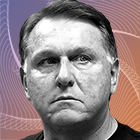

Like many elected officials,International Brotherhood of Teamsters general president James Hoffa has discovered that pension problemscan grow into a serious headache. Teamster pensions are provided by so-called Taft-Hartley, or multiemployer, plans, which extend across many companies and industries. Organizing and funding tend to be closely intertwined: Plans in regions with new workers fare better than in those with aging populations. The Teamsters’ second-largest plan, the long-troubled Central States Pension Fund, may be facing insolvency over the next decade or two. Hoffa, the son of Teamsters leader Jimmy Hoffa and a University of Michigan–trained lawyer who was first elected to run the union in 1998, finds himself in the middle of contending forces. On one side is Randy DeFrehn’s (No. 6) National Coordinating Committee for Multiemployer Plans, which has pushed for congressional legislation to amend ERISA and allow plans to reduce benefits rather than drain funds dry — pension reform, Taft-Hartley style. But the Teamsters have a vocal left wing, suspicious of Hoffa and his team, and opposed to cutbacks. Hoffa has tried to shore up that flank: After endorsing Barack Obama in the 2008 election, he penned a fierce attack on aspects of health care reform in a 2013 letter, arguing it would “shatter our hard-earned health benefits.” Last year Hoffa rejected the NCCMP plan, despite its support from multiemployer plans like the Western Conference of Teamsters, but has said little since. Time is not on his side, despite his organizing successes since taking the Teamsters out of the AFL-CIO (along with the Service Employees International Union, then run by No. 37 Andy Stern) in 2005. Hoffa, 73, is up for reelection in 2016.








































